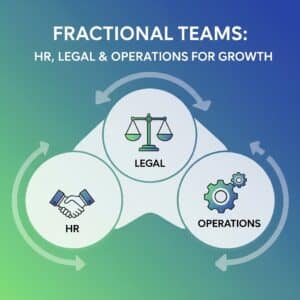The Rise of the Fractional Executive: More Than Just Finance
 For years, the concept of a “fractional CFO” has been a game-changer for small and medium-sized businesses (SMBs) that need high-level financial expertise without the cost of a full-time executive. A fractional CFO provides strategic financial guidance, helps with budgeting and forecasting, and ensures financial compliance. However, the benefits of the fractional model extend far beyond the finance department. The increasing complexity of today’s business environment demands expertise in various areas, and fractional executives are stepping in to fill those gaps.
For years, the concept of a “fractional CFO” has been a game-changer for small and medium-sized businesses (SMBs) that need high-level financial expertise without the cost of a full-time executive. A fractional CFO provides strategic financial guidance, helps with budgeting and forecasting, and ensures financial compliance. However, the benefits of the fractional model extend far beyond the finance department. The increasing complexity of today’s business environment demands expertise in various areas, and fractional executives are stepping in to fill those gaps.
Businesses are realizing that the same cost-effective, specialized approach can be applied to HR, legal, operations, and even marketing. This shift is driven by several factors, including the increasing demand for specialized skills, the flexibility offered by fractional arrangements, and the cost savings compared to hiring full-time executives.
Fractional HR Directors: Cultivating Talent and Compliance
Human Resources is more than just payroll and benefits; it’s the engine that drives employee engagement, talent acquisition, and compliance with ever-changing labor laws. For smaller businesses, managing these responsibilities can be overwhelming, leading to legal risks, high employee turnover, and missed opportunities for growth. A fractional HR director can provide the expertise needed to build a strong, compliant, and thriving workforce.
Benefits of a Fractional HR Director
- Compliance Expertise: Navigating employment laws, regulations, and compliance requirements can be daunting. A fractional HR director ensures your business adheres to all applicable laws, minimizing the risk of costly lawsuits and penalties. They stay updated on the latest legislation, such as changes to the Fair Labor Standards Act (FLSA) or the Affordable Care Act (ACA), and proactively implement necessary changes.
- Talent Acquisition and Retention: Attracting and retaining top talent is crucial for business success. A fractional HR director can develop effective recruitment strategies, implement robust onboarding programs, and create competitive compensation and benefits packages. They can also help develop performance management systems that encourage employee growth and development.
- Employee Relations: Addressing employee concerns and resolving conflicts requires specialized skills and experience. A fractional HR director can mediate disputes, conduct investigations, and provide guidance on employee relations matters, fostering a positive and productive work environment. They can also develop and implement policies that promote diversity, equity, and inclusion (DEI).
- Strategic HR Planning: A fractional HR director can help align HR strategies with overall business goals. They can develop workforce plans, identify skill gaps, and implement training and development programs to ensure the business has the talent it needs to achieve its objectives. They can also contribute to organizational development initiatives, such as change management and leadership development.
Example: A small tech startup was struggling with high employee turnover and a lack of clear HR policies. By engaging a fractional HR director, they were able to implement a comprehensive HR strategy, including a revamped onboarding process, a performance management system, and competitive benefits. As a result, employee turnover decreased significantly, and the company attracted and retained top talent, fueling its growth.
Fractional General Counsels: Navigating Legal Landscapes
Legal issues can arise at any time, and for small businesses, the cost of hiring a full-time general counsel can be prohibitive. A fractional general counsel provides access to experienced legal counsel on an as-needed basis, protecting the business from legal risks and ensuring compliance with all applicable laws and regulations.
Benefits of a Fractional General Counsel
- Contract Review and Negotiation: Contracts are the lifeblood of any business, and ensuring they are legally sound is crucial. A fractional general counsel can review and negotiate contracts, protecting the business from unfavorable terms and potential disputes. They understand the nuances of contract law and can identify potential risks and liabilities.
- Intellectual Property Protection: Protecting intellectual property (IP) is essential for maintaining a competitive advantage. A fractional general counsel can advise on IP protection strategies, including trademarks, patents, and copyrights. They can also help enforce IP rights and defend against infringement claims.
- Litigation Management: If legal disputes arise, a fractional general counsel can manage litigation, working with outside counsel to achieve the best possible outcome for the business. They can provide strategic guidance, oversee legal proceedings, and ensure the business is represented effectively.
- Compliance and Regulatory Matters: A fractional general counsel can help the business comply with all applicable laws and regulations, minimizing the risk of fines, penalties, and legal action. They stay updated on changes in the legal landscape and advise on necessary compliance measures. This includes areas like data privacy (GDPR, CCPA) and industry-specific regulations.
Example: A growing e-commerce business faced a trademark dispute with a larger competitor. By engaging a fractional general counsel, they were able to develop a strong legal strategy, negotiate a favorable settlement, and protect their brand. They avoided costly litigation and ensured the continued success of their business.
According to a study by the American Bar Association, access to legal counsel significantly reduces the risk of business disputes. Fractional GCs make this access affordable for smaller enterprises.
Fractional COOs: Optimizing Operations for Efficiency and Scale
As a business grows, operational challenges become increasingly complex. A fractional Chief Operating Officer (COO) brings expertise in streamlining processes, improving efficiency, and scaling operations to support growth. They provide leadership and guidance to ensure the business operates smoothly and effectively.
Benefits of a Fractional COO
- Process Optimization: A fractional COO can analyze existing processes, identify bottlenecks, and implement improvements to increase efficiency and reduce costs. They use tools and methodologies like Lean and Six Sigma to optimize workflows and eliminate waste.
- Strategic Planning and Execution: A fractional COO can work with the CEO to develop and implement strategic plans, ensuring the business stays on track to achieve its goals. They can help define key performance indicators (KPIs), monitor progress, and make adjustments as needed.
- Team Leadership and Management: A fractional COO can provide leadership and guidance to operational teams, fostering a culture of collaboration and accountability. They can help develop clear roles and responsibilities, improve communication, and empower employees to achieve their full potential.
- Technology Implementation: A fractional COO can help the business leverage technology to improve efficiency and effectiveness. They can evaluate different software and hardware options, oversee implementation projects, and ensure employees are properly trained. This might involve CRM systems, ERP solutions, or project management software.
Example: A manufacturing company was struggling with inefficient production processes and high inventory costs. By engaging a fractional COO, they were able to implement Lean manufacturing principles, optimize their supply chain, and reduce inventory levels. As a result, they significantly improved their profitability and competitiveness.
Research from Gartner indicates that companies with optimized operational processes are significantly more likely to achieve their strategic goals. A fractional COO helps facilitate this optimization.
Why Choose Fractional Over Full-Time?
The decision to hire a fractional executive versus a full-time employee depends on the specific needs and circumstances of the business. However, the fractional model offers several key advantages:
- Cost Savings: Fractional executives are typically paid on an hourly or project basis, which can be significantly less expensive than hiring a full-time executive with benefits.
- Access to Specialized Expertise: Fractional executives bring a wealth of experience and specialized skills that may not be available within the existing team. They have often worked with a variety of companies and industries, bringing best practices and innovative solutions.
- Flexibility and Scalability: The fractional model allows businesses to scale their expertise up or down as needed. They can engage a fractional executive for a specific project or for ongoing support, adjusting the level of involvement as business needs change.
- Objectivity and Fresh Perspective: Fractional executives can provide an objective perspective and identify opportunities for improvement that may be overlooked by internal teams. They are not tied to existing organizational structures or processes and can offer fresh insights and innovative solutions.
- Reduced Risk: Hiring a full-time executive is a significant investment, and there’s always a risk that the person may not be the right fit for the business. With a fractional executive, businesses can try out the relationship before making a long-term commitment.
However, it’s crucial to acknowledge potential downsides. Fractional executives require strong communication, clear expectations, and a well-defined scope of work. Effective onboarding and integration into the team are essential for success. Companies must be prepared to provide the necessary access and support to enable the fractional executive to perform their duties effectively. If you are looking for ongoing support or strategic direction, understand that fractional resources are not dedicated to your company full time.
Finding the Right Fractional Executive
Finding the right fractional executive requires careful consideration and a thorough vetting process. Here are some tips for finding the best fit for your business:
- Define Your Needs: Clearly define the specific skills and experience you are looking for. What are the key challenges you need help with? What are your goals for the engagement?
- Seek Referrals: Ask your network for referrals to experienced fractional executives. Referrals are often the best way to find qualified candidates.
- Check References: Always check references to verify the candidate’s skills and experience. Talk to previous clients to get a sense of their work style and effectiveness.
- Assess Cultural Fit: Make sure the candidate is a good fit for your company culture. They should be able to work effectively with your team and understand your business values.
- Establish Clear Expectations: Clearly define the scope of work, deliverables, and timelines. Make sure the candidate understands your expectations and is committed to delivering results.
Remember that finding a fractional executive is an investment in your business. Taking the time to find the right fit will pay off in the long run.
The Future of the Fractional Model
The fractional executive model is poised for continued growth as businesses increasingly recognize the benefits of accessing specialized expertise on a flexible and cost-effective basis. As the business environment becomes more complex and competitive, the demand for fractional executives in HR, legal, operations, and other back-office functions will continue to rise. For businesses struggling to compete and grow, engaging a fractional executive can level the playing field and provide the expertise needed to thrive. Fractional staffing allows for a more efficient, dynamic, and strategically sound business approach in a constantly evolving market landscape.
For instance, many businesses find themselves grappling with complex data privacy regulations. While they might not need a full-time Data Protection Officer (DPO), a fractional DPO can provide the necessary expertise to ensure compliance with regulations like GDPR and CCPA, building trust with customers and avoiding costly penalties. Similarly, smaller businesses aiming for rapid growth can benefit from a fractional sales operations expert who can design and implement sales processes, optimize CRM usage, and provide insights into sales performance. This proactive approach to sales operations can lead to improved sales efficiency, increased revenue, and a competitive edge.


